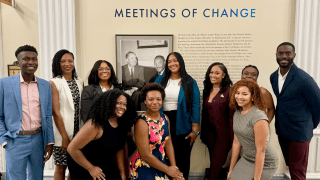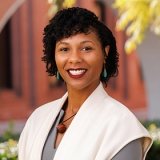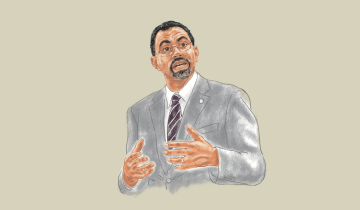At USC Rossier, students and faculty collaborate every day to positively impact the communities they serve through their work. As a leading institution focused on advancing educational equity, USC Rossier community members often have the opportunity to share their research with relevant policymakers, fellow educators and national thought leaders. If you research for impact, your research will make the greatest possible difference.
This fall, USC Rossier Associate Professor of Research Kendrick Davis, Assistant Professor of Education Dwuana Bradley and students from the USC Rossier Black PhD Collective furthered this work by participating in the Congressional Black Caucus Foundation’s Annual Legislative Convention in Washington, D.C. This year’s conference theme was “From Vision to Victory: Amplifying Black Voices.” The Annual Legislative Conference is the leading public policy convening focused on issues impacting African Americans and the global Black community. It is a unique platform where thought leaders, legislators, influencers and concerned citizens converge to discuss and address critical issues, forge partnerships, and promote the political, economic, and social advancement of Black communities.
“This kind of collaboration is crucial for creating an education system that is truly equitable and responsive to the needs of all students," said USC Rossier Associate Professor Kendrick Davis.
During their time at the conference, the USC Rossier faculty and student cohort, which was also joined by a sociology PhD student from USC Dornsife and a USC Rossier postdoctoral fellow, participated in numerous professional development workshops and hosted meetings with several think tanks, executive agencies, congressional staff and community advocates to preview their upcoming policy briefs describing priority issues for the upcoming 119th Congress and presidential administration.
Throughout their meetings, the cohort presented several specific ideas drawn from their research to help promote prosperity through educational and economic advancement and well-being for Black students and their families nationwide.
The group met with:
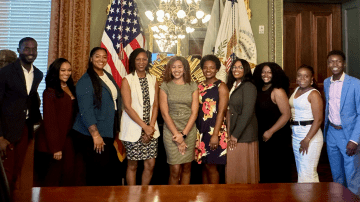
The cohort met with the National Space Council in the Vice President’s office at the White House to discuss the current work and priorities of the Administration. Dr. Quincy Brown, director of Space STEM and Workforce Policy, discussed the various ways the organization uses scientific data and analysis to recognize and disrupt naturally occurring and anthropogenic phenomena that impact our lived environment and experience. These events disproportionately impact vulnerable communities across the country, including racial and ethnic minorities, low-income groups and people living in rural areas.
U.S. House of Representatives
The group also met with members of U.S. Representative Mark DeSaulnier’s (D-CA) staff to discuss a wide range of critically important issues pertaining to federal education policy. Rep. DeSaulnier is a senior member of the U.S. House Committee on Education and the Workforce.
Specifically, the group discussed efforts at the federal level to address the rise in book bans, efforts to ban diversity, equity and inclusion (DEI) policies in our education systems, and more. The USC Rossier researchers cited their own work on the negative impact these policies have on the well-being of students and educators alike.
The group also discussed higher education affordability issues like addressing student loan debt, the Public Service Loan Forgiveness (PSLF) program and the importance of making a good-quality education accessible and affordable to all.
“So much of the D.C. Immersive Policy Institute was about facilitating an experience that provides a catalyst for students to envision themselves as self-determined, community-driven scholars with the skills needed to effect large-scale impact,” said USC Rossier Assistant Professor Dwuana Bradley.
DC College Access Program (DC CAP)
The group met with Eric Waldo, president and CEO of DC-CAP. Prior to joining DC-CAP, Eric served as senior policy advisor at the Obama White House and as founding executive director of First Lady Michelle Obama’s college access and success initiative, Reach Higher.
At the meeting, the group discussed the federal government’s role in K–12 and higher education, particularly in improving student access, affordability and financing. Additionally, they explored various professional pathways available to education researchers across the policy landscape.
American Educational Research Association (AERA)
Felice Levine, Lori Diane Hill and George Wimberly of AERA met with USC Rossier faculty and students to discuss their advocacy in federal policy, entry points into policy work for graduate students and strategies for forming productive relationships with professional organizations at various phases of one’s career.
The group met with Curtis Valentine, co-director of the Reinventing America's Schools Project. They learned from a discussion about his work in domestic and international education reform. They also discussed tensions between traditional and public charter schools relating to competition for funding, accountability and oversight, and equity in access using selective enrollment mechanisms.
Jinaan Bitar, director of higher education research at The Education Trust, met with the group to discuss the critical role policy research firms and education think tanks play across the landscape of federal policy formulation. Jinaan shared her professional journey with the students, including how she started with very little quantitative skills but developed them through experience over time, and encouraged the students to be open to learning and applying new skills. Further, the group discussed how EdTrust uses research, data and analytics to identify and address issues of racial and economic inequality.
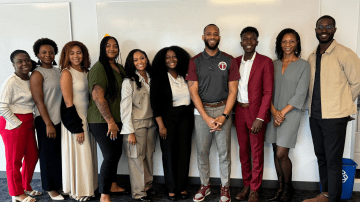
Glenn Starnes, senior deputy chief for DCPS hosted the group at their headquarters. The conversation touched upon Glenn’s role and work as head of the SEAD (Social Emotional & Academic Development) Office and the shared challenges of supporting educational improvements in urban districts like DCPA and the Los Angeles Unified School District.
The group held a debrief session when they returned from Washington to discuss how to apply the knowledge they gained from the experience to their own research and professional efforts. The group intends to collaborate on a series of policy briefs organized around K–12 and higher education, workforce development, STEM education and educational technology priorities for a new presidential administration that supports educational goals at the state and local levels and helps schools throughout the nation commit to achieving educational equity through practice, research and policy.
“Too often, education programs overlook the importance of policy experience in tackling the structural and systemic issues that hold back real progress,” said Kendrick Davis. “By bridging the gap between research and policy, we were able to engage directly with national leaders, shaping solutions that foster real, lasting change. This kind of collaboration is crucial for creating an education system that is truly equitable and responsive to the needs of all students."
“At this moment in time, perhaps more so now than ever before, students are looking to faculty and staff for examples of how to integrate their personal, professional and scholarly identities,” said Dwuana Bradley. “Students want to do this in ways that are personally fulfilling and community-centered. So much of the D.C. Immersive Policy Institute was about facilitating an experience that provides a catalyst for students to envision themselves as self-determined, community-driven scholars with the skills needed to effect large-scale impact.”
As USC continues to build upon its Capital Campus and deepens the impact and collaboration it has with our nation’s leaders, USC Rossier is playing a pivotal role throughout the process. USC Rossier students and faculty alike have established themselves as reputable sources of cutting-edge research that can effectively inform public policy and create an education system that is more equitable and stronger for everyone.

